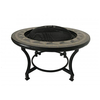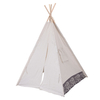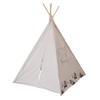-
Home
-
Contributors
-
International
-
Account
-
Information
More From Contributor
Includes:: a step-by-step process for setting up your wormery. ...
Includes:: a step-by-step process for setting up your wormery. ...
Includes:: a step-by-step process for setting up your wormery. ...
Includes:: a step-by-step process for setting up your wormery. ...
Includes:: a step-by-step process for setting up your wormery. ...
Includes:: a BBQ grill, mesh guard & firetool.
Materials: Fire bowl made from steel, legs made from steel tube & table top & closure made from Tile. Dimensions:76cm length x 76cm width x 58cm height Please note: Metal fire bowls will rust if they are left outside in all weather conditions. All can be repainted & the rust does not affect the use. The metal fire bowl surfaces can become very hot when in use so be sure to allow to cool before touching or moving. We recommend the use of a chimenea guard when small children are present. ...
Materials: Steel frame, felt lining, FSC timber, rattan
Colour: Natural brown & painted grey Special
Features: Waterproof, sturdy entrance ...
- the perfect hideout every kid needs. Lightweight, easy to store &
Includes:: a patterned carry bag & instructions to make your life easier. Weight:2kg
Material:100% Polyester Dimensions: 1600 x 1005 x 1005mm Please note: cushions are not included ...
- the perfect hideout every kid needs. Lightweight, easy to store &
Includes:: a patterned carry bag & instructions to make your life easier. Weight:2kg
Material:100% Polyester Dimensions: 1600 x 1005 x 1005mm ...
- the perfect hideout every kid needs. Lightweight, easy to store &
Includes:: a patterned carry bag & instructions to make your life easier. Weight:2kg
Material:50% Polyester & 50% Cotton Dimensions: 1030 x 1030 x 1600mm ...
Tiger Worms For Wormery
dead organic waste into nutrient-rich compost. These are: The Tiger worm, aka the Brandling worm. Proper name Eisenia fetida. The Bluenose worm, aka Dendobaena and the European nightcrawler and by some as Eisenia hortensis. Proper name Dendrobaena veneta. The Redworm, aka the red wiggler and the Brandling worm. Scientific name: Eisenia Andrei. All are good and will work well in your wormery. But, for adaptability, conditions tolerance, versatility, and composting rate the answer is the Tiger worm. Some Worm facts: Tiger worms are a little more expensive and significantly better than Dendrobaena in Wormeries. Young worms are preferable (hungrier) to older worms. When it comes to composting - the condition, age, size and species of worm is more important than their weight. Tiger
worms reach sexual maturity (they are hermaphrodite) in approx 6 weeks. Dendrobaena are more widely available than Tigers as there is an established 'cottage' industry breeding them for anglers who hook them up as bait. They are also easier to harvest and are usually cheaper. View our new ‘Building Your Wormery Guide’ which includes a step-by-step process for setting up your wormery.
- Availability: In Stock
- Supplier: Water Butts Direct
- SKU: 14-0500
Product Description
Tiger worms are the best worms you can use in your wormery for worm composting. Supplied in breathable pouches & sent by secure delivery service to arrive in a healthy condition. Due to our storage methods, worms may arrive in a dormant state. They are still happy & healthy but may need a few days to wake up. Our Tiger worms are sent in pouches weighing 250 grams per pack with soil in the pack for their comfort. PLEASE NOTE: Pouches are produced by weight. The number of worms per pouch is dependent on the size of worms. If you are redeeming a Worm Card Voucher, click HERE to redeem your voucher by adding it to your basket & then proceeding to checkout. So why are Tiger worms best for a Wormery? There are three native species of worm which are all good at the rapid processing of dead organic waste into nutrient-rich compost. These are: The Tiger worm, aka the Brandling worm. Proper name Eisenia fetida. The Bluenose worm, aka Dendobaena & the European nightcrawler & by some as Eisenia hortensis. Proper name Dendrobaena veneta. The Redworm, aka the red wiggler & the Brandling worm. Scientific name: Eisenia Andrei. All are good & will work well in your wormery. But, for adaptability, conditions tolerance, versatility, & composting rate the answer is the Tiger worm. Some Worm facts: Tiger worms are a little more expensive & significantly better than Dendrobaena in Wormeries. Young worms are preferable (hungrier) to older worms. When it comes to composting
- the condition, age, size & species of worm is more important than their weight. Tiger worms reach sexual maturity (they are hermaphrodite) in approx 6 weeks. Dendrobaena are more widely available than Tigers as there is an established 'cottage' industry breeding them for anglers who hook them up as bait. They are also easier to harvest & are usually cheaper. View our new ‘ Building Your Wormery Guide’ which
Includes:: a step-by-step process for setting up your wormery.
Reviews/Comments
Add New
Intelligent Comparison
We couldn't find anything!
Perhaps this product's unique.... Or perhaps we are still looking for comparisons!
Click to bump this page and we'll hurry up.
Price History
Vouchers
Do you know a voucher code for this product or supplier? Add it to Insights for others to use.


 United Kingdom
United Kingdom
 France
France
 Germany
Germany
 Netherlands
Netherlands
 Sweden
Sweden
 USA
USA
 Italy
Italy
 Spain
Spain













 Denmark
Denmark